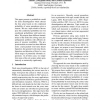Free Online Productivity Tools
i2Speak
i2Symbol
i2OCR
iTex2Img
iWeb2Print
iWeb2Shot
i2Type
iPdf2Split
iPdf2Merge
i2Bopomofo
i2Arabic
i2Style
i2Image
i2PDF
iLatex2Rtf
Sci2ools
ACL
2010
2010
Topic Models for Word Sense Disambiguation and Token-Based Idiom Detection
This paper presents a probabilistic model for sense disambiguation which chooses the best sense based on the conditional probability of sense paraphrases given a context. We use a topic model to decompose this conditional probability into two conditional probabilities with latent variables. We propose three different instantiations of the model for solving sense disambiguation problems with different degrees of resource availability. The proposed models are tested on three different tasks: coarse-grained word sense disambiguation, fine-grained word sense disambiguation, and detection of literal vs. nonliteral usages of potentially idiomatic expressions. In all three cases, we outperform state-of-the-art systems either quantitatively or statistically significantly.
ACL 2010 | Computational Linguistics | Conditional Probability | Sense Disambiguation | Word Sense Disambiguation |
| Added | 10 Feb 2011 |
| Updated | 10 Feb 2011 |
| Type | Journal |
| Year | 2010 |
| Where | ACL |
| Authors | Linlin Li, Benjamin Roth, Caroline Sporleder |
Comments (0)

